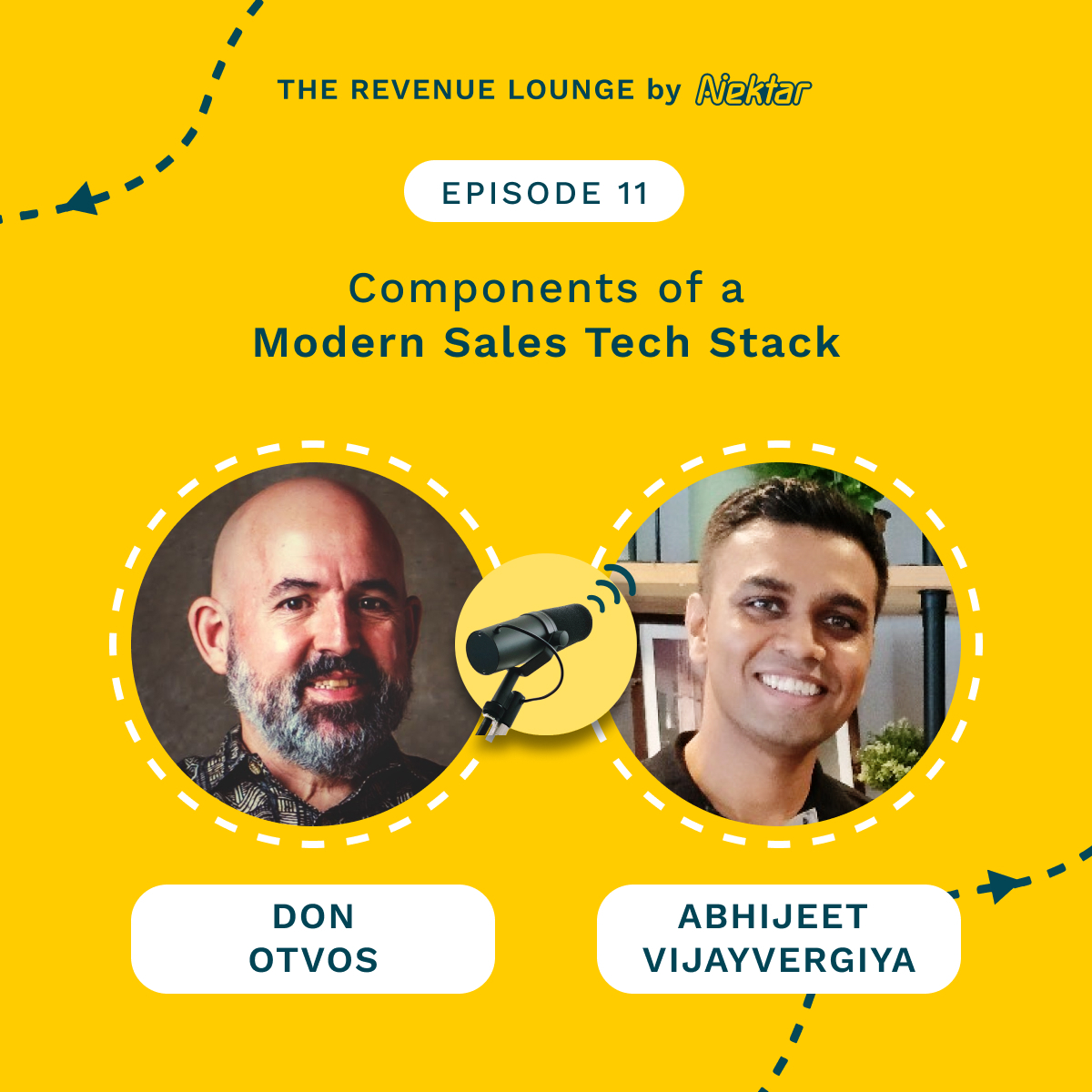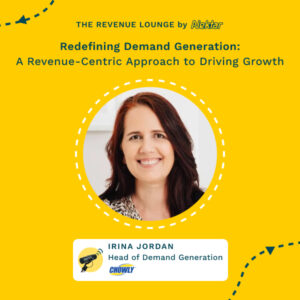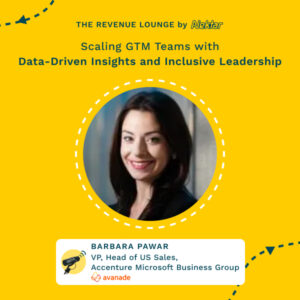Ep #4: Creating a Successful RevOps Roadmap
October 5, 2022
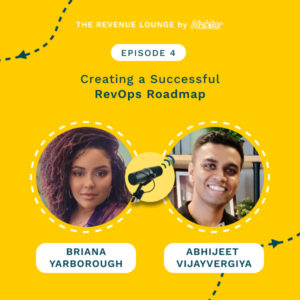
About
The Revenue Lounge
The podcast covers stories from leaders across RevOps, Sales, Customer Success, GTM, Data and Marketing about what drives these functions and what advice they would share with our listeners. With 3 seasons recorded, the podcast currently features 50+ enterprise leaders in the B2B SaaS domain. Tune in to hear from the best in the business
More than half of chief sales officers are executing or considering developing a RevOps function in their organization. There have been several studies that have proven the impact a RevOps model can have in aligning teams and driving predictable revenue.
But where does one start?
What is the first step?
We’d like to cover some basics to help those who are just starting out. Let’s hear it from our guest – Briana Yarborough.
Counted as one of the top RevOps leaders of 2022, Briana serves as an advisor and an executive leader for several high-growth start-ups. She is a speaker, educator, and mentor, with proven success in helping start-ups scale. She has over 15 years of expertise and her core specialties include driving predictable revenue growth, tech stack augmentation & rigor, stakeholder engagement, aligning the buyer’s journey, predictable pipeline and sales forecasting insights and much more.
Briana is also a champion and engaging member of a number of communities created for marginalized groups in tech.

[00:00:00] Hello and welcome to the latest episode of The Revenue Lounge. Our guest today is Briana Yarborough. Counted as one of the top rev op leaders of 2022, she serves as an advisor and an executive leader for several high growth startups. She’s a speaker, educator and mentor with proven success in helping startup scale shares over 15 years of expertise.
[00:00:21] And her core specialties include driving predictable revenue growth, tech stack augmentation, stakeholder engage. Aligning in the buyer’s journey and delivering a predictable pipeline. Thank you so much, Brianna, for joining us today. We are very excited to learn from you. So why don’t you tell us a little bit about yourself and what you’ve been up to lately?
[00:00:39] Absolutely. So glad to be here today with you and to get to share on this platform. I’ve been doing this for over 15 years based out of Houston, Texas. And it has been a wild and fun ride. Just, you know, the, the transitioning from doing the strategy operations, financial planning, and business intelligence to like [00:01:00] really realizing, hey, this is revenue operations from way back when to now, and seeing how it’s evolved and how much awareness we’re starting to see in this category in this.
[00:01:10] And in addition to that, a co-founder of a revenue intelligence sort of platform called C Model. And what we consider it to be is just an analyst ready for the fingertips of on demand analyst, ready for the fingertips of executives. People oftentimes at the executive level, they don’t really wanna see, uh, tables or, or spreadsheets or anything like that.
[00:01:31] They just want answers and they want strategy. And so that’s what C model I is bringing to the table. Now outside of that, I’m also working with, again, those marginalized startups. They’re often under supported, underfunded, and they don’t really get what they need to, you know, really survive in this marketplace, in this industry and SAS at in general.
[00:01:52] And so, um, passion of mine is to, you know, obviously help the underdog and, um, [00:02:00] that’s what I do with my skillset. I kind of started out in big business and corporate life with oil and gas because of Houston, Texas. And that has turned into me being able to really, uh, you know, be a builder of businesses and really appreciate and contribute to seeing more of people that look like me and, you know, doing more for our.
[00:02:23] Awesome. That’s great introduction, Brianna and, and good to see you yourself, are a co-founder. So very exciting and I can totally relate to the journey that you’re undertaking being a co-founder myself. So we all know what it takes to burn the midnight oil. Thanks for sharing that. So as our listeners already know, more than half of sales leaders are executing or consider.
[00:02:43] Developing a rev ops function in their organizations. There have been several studies that have proven that the impact of a rev ops model can definitely help in aligning teams and driving predictable revenue. But where does one start? What is the first step in order to get that rev off function going?
[00:02:59] So we [00:03:00] like to cover some basics here to help those who are just starting out. So I love to ask you a few questions around that, which can help our listeners in that regard. So my first question to you, Rena, is what is revenue? What, what is it according to you, how would you define it? It takes a special person, Let’s say that it takes a very special person that has a growth mindset and, um, revenue operations is a function, really is about aligning the entire organization across the customer’s life cycle, across the customer’s journey.
[00:03:30] And so you really wanna strategize, create processes, establish the tools that you need, establish the data points that you need so that you can derive KPIs, be able to do the. And bubble up insights to your C-Suite bubble up insights that’ll be shared in investor meetings, board meetings and the like.
[00:03:48] And you do that because without revenue operations. These teams are departmentally siloed, and they’re kind of working with their head down with their own priorities and their own [00:04:00] objectives. And Rev op comes in and we are sort of the foundation and the glue behind all of the operations that are happening.
[00:04:08] We are aligning stakeholders. We are making sure everyone’s on the same page where the student posts about operational cadences, implementing operational cadences so we can. You know, conversations with the right people at the table at any time, it’s something that allows you to have visibility into.
[00:04:28] execution outcomes, measuring those outcomes, and then being able to iterate it. It also is that growth mindset. That means continuous iteration, continuous improvement from there. Great. I think that’s a, that’s a good fundamental answer to what rev ops is. I’d love to understand better from you, when does an organization start Rev ops, because there’s so many things to be done in GTM in general as the organizations go through their product market fit experience and scale journey.
[00:04:58] But according to you, what’s the best time [00:05:00] for any organization to start Revenue operations? Yeah, I would absolutely say. Start as early as you possibly can, even if you have a one person team and you can understand what those priorities are, and you can then begin to, you know, earmark, these are the things that we’re gonna accomplish in q1, q2, q3, q4, um, to drive one, not only having that accountability partner, but coming in at a later stage, say series C, series B, even.
[00:05:31] Um, you’ve got so much historical data, no consistency around it, and it really makes for complicated cleanup effort. I’ve been through it, I’ve been there, um, and they’re also not just the accountability partner, they’re the educator. And again, that glue foundation, the art and the science behind the intent of really hyper growth.
[00:05:53] How can you really understand? how your company is performing without visibility into [00:06:00] these details. And as we’ve seen before, the rise of revenue operations companies didn’t have the same visibility that they do now. There’s new technologies, there’s new methodologies, and that is what revenue operations is all about.
[00:06:16] And so I would definitely say start as early as you possibly can, even if it’s just, you know, a rob ops manager. Try to make it not, you know, there’s a portion of tactical work. Sure. But allow them to also be a strategic leader in the organization because they are gonna be the ones that are helping, you know, direct and, and support the way that we need to move and pivot the strategies that we’re implementing from a go-to market standpoint to drive that pipeline generation.
[00:06:45] And so they have very influential in the organization, not an order taker by any means. And there’s a lot of strategy behind this work. Yeah, I mean, I loved what you said there. Rev Ops is the accountability partner to the go to market team when that [00:07:00] summarizes it all, and it’s such a critical function.
[00:07:02] Definitely. The earlier you put in, the better it is. So for those of us who want to implement a revenue operations function, what are the first steps do you advise people take in order to build a very robust and scalable rev ops function? Yeah, for me, the first steps are really, you know, if I think about a 30, 60, 90 day plan, those are my first steps.
[00:07:22] I wanna go into a road show, I wanna listen to all of my stakeholders and, and, and not to, you know, provide value right then and there. I’m, I’m new to the organization, I’m just understanding the business operations. I wanna go out there and understand them even better, um, past the interview phase. And so evaluating what the current.
[00:07:41] State of affairs are what, what are we currently doing today? What are, are, where are our bandaids? I’m looking for, you know, asking all of the right questions to truly understand. All right, so what have we thought about strategy and customer experience, or how have we, uh, evaluated our, um, our omni-channel [00:08:00] marketing, you know, plans to, to generate pipeline?
[00:08:03] Are there SDRs in. If so, what are we currently doing from a quota standpoint for any of our sellers and, and what are we doing from a compensation standpoint? So everything from what I consider like the main elements, you know, strategy, process, workflows, data analysis, technology, those things are highly critical to any.
[00:08:25] revenue operations function, and you can’t truly start to just come in and and do what worked at another company. Every business model is different. Every organization is different, and if you don’t have the context, you can’t really implement and then begin to think about how to measure against what you’ve implemented and then again, continuously approve upon that.
[00:08:50] And so I would definitely say first steps are evaluate. Listen, and then start to build out your roadmap and continue to have the conversations with [00:09:00] those folks and say, Here’s what I’m thinking. Tell me if there is something that has been tried in the past that does not, didn’t work out, didn’t pan out too well, or if there are things that are here in this roadmap that I need to clarify for you so that we’re all in alignment.
[00:09:15] The other thing that I would say is instituting operational objectives. Organizational objective. Like OKRs from the top level of the organization and having them be transparent throughout the company. Attaching goals to those makes our jobs easier as revenue operations. Just throwing a revenue target at us and saying, Hey, double the revenue by, you know, year over year, let’s double it.
[00:09:38] It is not enough. There are a lot of other objectives that happen within an organization. Tying what you’re doing from a priority standpoint to that is also a part of one of those, those first steps. Yeah, I mean the 30 16 90 day plan always works. I mean, having that plan in place and then [00:10:00] following a playbook that you described, I think it’s a great way for anybody to think about setting up the revenue function and, and get started in those early days.
[00:10:07] Great advice. Thanks Brianna. I’m very curious to understand, how did you get into. So what’s the story behind that too? Yeah, so I, um, you know, I think it was by luck. I was in oil and gas and I had an opportunity present itself to come and be an operations director. I had a chief strategy officer that was supposed to move and we were building a regional office.
[00:10:31] Here in Houston to accommodate all of the, uh, sort of field work that would be needed here for the oil and gas industry to target them as our clients from the cybersecurity company. Now, this CSO never moved down, and here I am doing the job without the title and the pay and you know, I, about 25 of those team members were go to market team, and so we started to just really.
[00:10:59] [00:11:00] A lot. It was really on me to create that alignment and, you know, report back up to our, our main office and, you know, have conversations around targets and have conversations around establishing KPIs that we were paying attention to. Uh, progress report conversations, operational ca cadences around pipeline conversations.
[00:11:20] Doing the forecasting, things of that nature. And so the full nine, um, out of just sort of what I would consider to be a stretch opportunity, like a, just purely based out of look. I mean, it’s not like I had never done fp and a or anything like that before, uh, undergraduate degree. It just so happens to be in supply chain management, mba.
[00:11:41] They make you do all of this stuff. Coming in and doing it for a tech company when you hadn’t worked for one is an interesting thing. But you go out there and you find the answers and you make it work. And that’s exactly what we did. Awesome. Great journey, uh, from oil and gas to leading a revenue operations function.
[00:11:58] That’s, that’s such a, such an [00:12:00] interesting journey. I think you touched upon an interesting point around data. I mean, how important it is to get the data right. And for some of these growing companies, they are sitting on piles and piles of data, which probably is not accurate. It’s scatter. So what’s the best way to gather an accurate view of this data across departments?
[00:12:18] So I have experienced what I would consider chaotic data. It was, you know, here I am going through a, a series B fundraise, and I’m also doing a second year audit. Um, between the two, both of those entities are asking for due diligence or some sort of reporting or some sort of outlook. And as with f p and A in my title at the time, you know, you would expect that I would be able to get it right.
[00:12:47] It was all based off of assumptions prior to me. What I did was I implemented revenue operations and that got tacked onto my, to my title. and I integrated systems. I created, [00:13:00] you know, a data warehouse and implemented business intelligence as a part of the key driver of information so that we could a see in real time, how are we performing as a business?
[00:13:11] What are the KPIs that we need? Let’s go and configure assistance to capture these data points. And you know, connecting a CRM to an E R P is so huge, especially when you have a service that is multifaceted when it comes down to pricing models. And so we had the license fee, we had usage base, and we had professional services.
[00:13:32] And so that made it even more fun because we had to implement other things across the board. New. To capture time and implement unique identifiers in a major cleanup effort. And so I would say the number one thing that you can do to get an accurate view of data across departments and across your organization is to, one, based on your business model.
[00:13:57] Make sure that you have those integrated systems. Make [00:14:00] sure if there are companies with multiple contracts, you have unique identifiers that connect ex. The customer journey as well. And, um, and from there, really understand what it is that you’re trying to drive out. Um, various business models like marketplaces don’t have the same sort of KPIs as, let’s say, a subscription company that is just selling something and it’s easily provisioned at that very time.
[00:14:25] And so they don’t have to think about revenue recognition in the same way. They don’t have to think about some of the other things that other companies have to think about. So the top line answer to that question, Integr. Sums and understanding your business model and capturing the data points that are important to be able to understand how your business is performing.
[00:14:44] Yeah, great framework for somebody to follow as they deal with this scattered data problem that exists today. Thanks for sharing. Moving on to the next question I do give. Great. To understand how this data can be leveraged to generate insights, right? You mentioned that a lot of this data once [00:15:00] brought together can, can help organizations take some business decisions as they go through this grow journey.
[00:15:05] So what are the common type of analytics that you would prioritize? For a growing rev ops team, what should they focus on in terms of business value delivery? Yeah. I always look at things like annual recurring revenue, the cost of customer acquisition tech. How much are we spending in various channels?
[00:15:22] If we’re not seeing high performance in those areas and we’re seeing better performance in organic, for example, then why are we spending the money clv, customer lifetime value cell cycle time? How long is it taking to actually close the deals once they’re aware of. And Sheed conversations with them. How long does it take to actually close the deals?
[00:15:41] I’ve worked for an organization that had an enterprise go to market, um, service offering or pro platform, sorry. And um, it was a seven figure product and a major digital transformation. And because of that, the sales cycle was like 12 to 24 months. And so you, you work as a revenue [00:16:00] operations team to figure out how to reduce that time.
[00:16:03] Um, other, uh, analytics that I kind of think about are forecasting accuracy. Forecasting is a big, huge part of revenue operations. If you’re not thinking one, if you’re not looking at historical data, to be able to look for sort of trends and kind of tying that into what we are thinking to go ahead, go forward with that additional element of growth factored into.
[00:16:27] and then seeing how far off we are from an accuracy standpoint, you’re not doing it right. Um, and then from a customer experience standpoint, I also think about renewals, upsells, cross sells, churn rates and product usage. And so PLG is something that is a major, you know, in recent years has become a major thing in the SaaS industry.
[00:16:50] And we wanna consider what the contract language, specif. Is it by C? Is it by hour? Is it by minute? And [00:17:00] unfortunately, at one company it was all three . We had some inconsistencies in our contract language. And so those would be the top things that I would think about. And just to add one more productivity, one thing that informs me of how.
[00:17:14] My enablement efforts for the organization from the moment they onboard into the sales organization to following through on, you know, do you know how to find the process roadmap for, you know, our deal desk processes? Or do you feel comfortable using this system in the way that we use? Framework around medic, for example, having those enablement office hours, a Slack channel, being able to see productivity levels.
[00:17:42] How much time are you spending in these systems and how many activities, sales activities are happening? Is there someone that is extremely high performing? And we can start to level that into, uh, even playing field so that we can all have more consistent [00:18:00] productivity metrics that we’re seeing. From a, A seller and their ability to feel comfortable with being able to utilize the systems from processes that we have put in place.
[00:18:12] And where do you think Rev op stands in 2022? How has this function changed in your opinion in the last five years? Boom. I’ll start with the last five years. Over the last five years, I think there has been a lot, uh, a lot more greater awareness around people entering the function. There’s been more talks about it.
[00:18:29] We used to see sales ops roles that have now branched out into revenue operations roles. They are sort of supporting the visibility into. Performance of the business. And so there’s a lot of founders of SaaS companies, for example, that see the value and they’re hearing more about it, and they’re learning more about it through things like this.
[00:18:52] This conversation that we’re having right now. And the facts and the details that we get from Forster Reports, [00:19:00] Gartner and many other of the, uh, sort of researchers that are out there, understanding specific industries and specific pieces of, you know, functions and departments that go into these industries.
[00:19:12] And the return on that investment of investing in those. And there are high returns in re investing in revenue operations. That’s what I’ve noticed over, you know, the past five years in 2022. I think there are still the, the, the changing of dynamics of what it really means to be revenue operations. And again, it’s variable based off of your business model, your pricing model, your sales motion, and it’s a constant state of evolution, I think in my mind.
[00:19:42] You know, while we’re thinking about the cu the entire customer journey a few years ago, we were just thinking. Sales, customer experience and marketing and that’s it. I didn’t go step outside of that at all. But now we’re really thinking about how do we partner up with finance or [00:20:00] HR or product to further streamline some of the operations that are interconnected, like compensation planning or like PLG models.
[00:20:10] In addition to that, we’re just also in, um, the state of where we are influencing and educating others. Still here in 2020. Um, you know, while it has become a common trend and a common topic to have those conversations around robots, And I, it’s so complex that I don’t think that everyone often gets it. So when you say things like, Oh, it’s the art and the science and it’s the glue and the foundation, it’s like, well, what does that really mean?
[00:20:40] It just means that we are strategizing for the entire go to market team and then some, and then from there, you know, creating, you know, revenue intelligence. How we’re performing forecasting, pipeline bookings, revenue recognition if it exists, because sometimes you don’t [00:21:00] have systems that are provisioned immediately.
[00:21:02] And we have ASC 6 0 6 to consider, and then a lot more technologies, I think are on the horizon that help you do these jobs better. And so that’s the other piece that I’m seeing in 2022. there. O obviously has been an untapped market. We were forced to use spreadsheets in Salesforce and you know, HubSpot to some capacity and other systems that have been around for some time to derive these insights.
[00:21:29] And now there are tools that are available that help get the access to the information in more real time because they connect via API into. Systems, and so I think that that’s phenomenal. It makes our jobs easier because we’ve been doing it the long way for such a long time. Over the next five years, I think people or founders will, will start to take it to the next level.
[00:21:52] I think that there will be suites, um, similar to, you know, back, you know, back in the day I’m thinking about oil and gas days. We used [00:22:00] SAPs for ha. Right? And we use. Um, you know, a Reba e e platform for procurement, and that was just like a marketplace. For people that don’t know, I think we will start to find those full suites that tap into every portion of the business and supports every portion of the business from a revenue operations mindset, which is, no, I don’t, I think revenue operations mindset equals growth mindset equals continuous improvement, right.
[00:22:30] And if you have that infrastructure and you think about your data architecture and the way that things flow through systems and, and the way that we are currently in a state of using, I don’t know, upwards of 30 systems at one organization. , What if we could reduce that down by simplifying at least the go to market or the revenue engine portion of that with a full suite of technology that would be able to do all that we [00:23:00] needed it to do and do it extremely well?
[00:23:02] Because you under understand the nature of the business. And so I think that’s where we’re headed. And I, and I’m looking, you know, I haven’t seen it yet. It might be out there, they might be getting off the ground, but, uh, I, I think that that’s, that’s what’s to. Also more leadership opportunities, you know, out seeing more chief revenue operations officers, right?
[00:23:25] Seeing more SVPs of revenue intelligence, I mean, revenue operations. Um, up until, I would even say up until last year or year, year and a half ago. The, the highest title you would see would probably be a senior director. And so they didn’t have quite the same authority or power. You had to really leverage your influence in those sort of situations.
[00:23:54] But now we are really, truly getting a seat at the table and being recognized. [00:24:00] A, you know, accountability partner, a leader of the space, someone that has true value to add to the organization. And because of that, we are seeing those higher titles. We’re starting to see a career ladder. Interesting. You just assure the crystal ball to us on how ops is going to shape out.
[00:24:19] I mean, One tool to replace them all. Sounds like a very interesting vision. I think a lot of organizations we also speak with that do talk about too many tools to use. Definitely an interesting point that you made. I think there’s a future for, well, something which is more integrated and delivers a better user experience and and value to the organization.
[00:24:39] You go silly. My ideal, listen. You heard it from me first . Yeah. Yeah. I’m gonna write it down. Yeah. So I think you’ve, you’ve, uh, built such an interesting career for yourself in revenue operations. What advice would you give to somebody who’s a newbie, who’s like, Wanting to start a career in Rev op, just [00:25:00] finding their feet.
[00:25:01] What would be your advice on how they can go and make a career into DevOps op? Yeah, I think your research leveraging communities. I am a part of a ton of revenue communities. Rev Genius, Rev op, co-op Pavilion. Pavilion is amazing and you know, absolutely worth it. But even have certifications. Also utilizing the free resources that are available to get up to speed.
[00:25:28] So Salesforce has. What is it called? Trailblazer or a trail head, something like that. I haven’t been in there in a long time, . But it helps you understand the system and how to use the system and be able to get certified in some capacities in various areas. HubSpot has something very sim similar knowledge base, certification, learning and develop.
[00:25:52] For people in the space. The HubSpot actually recently rolled out a revenue operation certification. I’ve been seeing a lot of people [00:26:00] posting those on LinkedIn and I’m like, Hmm, do I need to get this ? And so, you know, I, I think that those are great ways to start just kind of getting informed about what it really means, because I think there.
[00:26:16] This piece of, Oh, well, rub op sounds really cool. And it’s a hot topic, and they’re fun. They’re a fun group of people because we, we are, we, we do things that are very humorous, especially on LinkedIn. We talk about our stories and our interactions and some of the things that we’ve experienced. We post memes, we post js, and they’re, And they’re hilarious.
[00:26:36] And they’re relatable. And so when you see that, you automatically want to be a part of that group, but you really have to understand what it. And so the other thing that I would suggest is informational session. If you see someone that is out there and they’re providing content on LinkedIn and they’re working for a company that you might wanna work for in, in a similar sort of role, for example, [00:27:00] or if they’re in a, in a rob ops role in general, and they just seem like an interesting person that you could learn from, reach out to them and just say, I’d love to have an informational session with you to learn more about what it is that you do and, and go from there and see if it’s really something for you.
[00:27:17] Um, a lot of people kind of get into the rev op world by way of financial and planning analysis, either being a, a seller or a somewhere in the sales department already, and then figuring out that they were really good at operations and even just being in operat. Person in general helps you significantly succeed in this world because you are used to dealing with really challenging objectives or problems that you need solutions for.
[00:27:49] So having that soft skill of being sort of solution oriented and focused on. Creating sustainable processes, [00:28:00] sustainable strategies that will be future focused and help your organization grow. And just taking it from there would be, in my first couple of this is how you enter where you know, where you enter the space, and kind of starts to see if this would be a good fit for you.
[00:28:20] Because you’ve never done robots. You don’t know all of the things that it. But you could, if you joined those communities and you were a part of the channels or do some of the certification works, that you can truly understand what it’ll take and see if it’s a good fit for you. No day is the same.
[00:28:37] Everything is different. We spend a lot of time as proactive as I would like to think that we all are. You know, there’s always gonna be fires to put out. Are you adaptable and agile enough to be able to go out and, and really context switch in that way and maneuver around what needs to be done to get things moving.
[00:28:57] There’s a lot of dependencies that [00:29:00] go into revenue operations. Understanding what those dependencies are, For example, influence building relationships, rapport with your stakeholders, and you know, really understanding your systems in its, Configurations and all of the things that we talked about earlier from an evaluation standpoint, those are things that are important as well as you’re walking into your first rev op opportunity.
[00:29:24] Wow. That’s like an amazing, uh, playbook for anybody who wants to get into Rev op. A great advice for a lot of young folks who want to get into rev ops and, and build a career and, and this, this is a great opportunity. I mean, I was the other day looking at LinkedIn. They used to be around like 3000 odd people four years back who used to have anything in and around rev ops as a title.
[00:29:48] And I think that number has grown some eight to 10 times in, in the three, four years itself. And as you’re pointing out earlier in the conversation, Brianna, I think the future is rev op. The companies continue to invest into it, take it [00:30:00] seriously, so it can open up a, a very interesting career opportunity for a lot of.
[00:30:04] Who might not want to go into a quota carrying role, or might not want to go into a full fledged TM function, but want to go closer to the mechanics of it in terms of how revenue can be delivered in a sustainable, predictable manner. How you can contribute towards building a GTM engine. I think rev ops is, is as close as you can get to the front.
[00:30:26] Of the show. So this what brings us to the last part of our conversation, which is rapid fire questions. So I’ll ask you a series of questions and whatever comes to your mind, I will appreciate those answers as you hear the questions. So let me start firing. The first one is, what’s one book that you have loved in the recent past?
[00:30:47] I would definitely say radical candor, but Kim Scott, I really love about this book is, you know, it’s about guidance team and results. And as a leader of a function [00:31:00] in rev revelations, you’ve really gotta have that in place. You need to know how to motivate your people. You need to understand and meet them where they are, what are their career goals, Give them stretch opportunities, really provide that.
[00:31:12] Coaching, mentorship, the same thing that I was just saying earlier about. When you’re new to rev ops or you’re trying to figure things out, you may not know about all the communities that exist. Are you leveraging those communities, being able to network and speak with other people that are a part of those communities?
[00:31:29] It’s just a wealth of knowledge, and so I love the knowledge sharing ability and learning opportunities that they present to people. That guidance and creating a culture of just really. Praising and showing people that they are valued as well. You know how to give constructive criticism in a way that is not what I would consider be ego driven In the sales department.
[00:31:58] Yeah. Have a lot of, [00:32:00] let’s call it bro culture, and sometimes there’s ego and, and I’m an empathetic leader. I’m a. Pathetic leader that truly understands that everything will continue to move in the right direction as long as your team feels supported, and that’s the direction that this book takes you in.
[00:32:17] And so I would definitely recommend it as a good read for any leader outside of that. I haven’t seen any books on revenue operations specifically, but there are some great sales books that are out there, and I would definitely recommend just kind of taking a peek at some of those because it’ll help you resonate and learn more about what it means to be a great seller and what it means to be a part of a sales organization.
[00:32:45] Awesome. Talking about productivity, what’s your own favorite productivity? I would definitely say getting in front of conversations before they are really coming into fruition. For example, brainstorming sessions on [00:33:00] deals, major deals, and it depends, again, variability of the business model. But when you have enterprise go to market product, that’s seven figures.
[00:33:08] You wanna talk about it as much as you possibly can be before. Go in into a meeting and have to show a demo or have solutions engineering come in to talk about the, the technology behind it. And it’s a complex product. And so I think that when you are able to one, have the right people at the table and have them sort of own their pieces of the pie, you can really make something successful in a proactive manner by.
[00:33:40] Always engaging with your stakeholders early. And so the sooner the better. If you are anticipating end of year annual planning or a redesign of your compensation plan, two to three months before that actually needs to roll out, you need to start putting those meetings on the calendar to have those conversations [00:34:00] so that you can proactively begin to design what it may look like for the next fiscal year.
[00:34:06] Um, and so yeah, that would be my, that would be my answer. Proac, Um, being proactive in, in the way that I’m thinking about managing one operational cadences, it looks like an entire calendar and it’s something that you can probably build out within your first three months in an organization. The start and the finish of the, the school year is, you know, when each quarter is and you can design what that looks like.
[00:34:31] When do you need to have pipeline conversations? When do you need to have, uh, forecasting conversations? When do you need to talk? Annual planning for the next year and the do the top down, bottoms up forecasting. When are our investor meetings? When are our investor updates or board meetings? When are we reporting up to our C-suite?
[00:34:50] All of those things become a calendar of sorts of which you can then go ahead and start to place meetings on the calendar. Even things like your [00:35:00] go to market kick. Um, you start the fiscal year off within the first three months with kickoffs that are, you know, should be really value driven and tied back to where the organization is going and the organizational objectives that you are focusing on in the coming year so that everybody walks away aligned and motivated to go out there and conquer.
[00:35:23] Yeah. Awesome. And what’s your favorite part about working in. So I would’ve to say that no two days are the same, right? Uh, you’re highly embedded throughout the entire organization. Often get to be involved in a lot more than just what your job description entails. And so I have done everything from owning organizational objectives, like the actual okr, and then managing the people that were part of the team on that okr and the progress that we were making and designing that project plan.
[00:35:55] All of the other things. It had nothing to do with my job. I actually think it was around employee [00:36:00] retention or employee engagement, and so it was just a fun exercise. You know when you have that ops mindset, everyone kinda wants to throw things and bounce things off of you. You are the person that they come to for advice or like design thinking of how can this be?
[00:36:17] Um, and again, I, I am, I’m also a DEI champion At almost every company that I’ve ever worked for, I have volunteered to lead rgs or do other DEI efforts, whether it be task force. Or thinking about where we’re sourcing our candidates and our retention policies. So again, brain Power Ops power is something that is really exciting and I love just being in the mix of a variety of things and thinking about the holistic way of building the entire business, not just being a specialist in one specific area and leaving it at that.
[00:36:57] I don’t thrive in a specialist capacity. [00:37:00] People that have a rev op mindset, they thrive in multifaceted sort of mindsets that help growth. Interesting. And what would be the least favorite part of being in operat? I would say my least favorite part of being in operations is when I have been a person or a person of one, understaffed, underfunded, and it’s not easy, but that’s where you bring into the equation prioritization and time management.
[00:37:29] It becomes your best weapon to have conversations about. Okay. Manager or whoever, uh, other stakeholders. I think it’s important for you to know these are the priorities that I am looking at accomplishing in q1, and outside of that, I really don’t know how much more bandwidth I have, but if there are priorities that come up, let’s have a conversation about it.
[00:37:56] Outlining those intricate details really help [00:38:00] support that person of one, even though it’s not easy. We have SaaS companies that are in C Series A, Series B, and they want that revenue operation support as early on as possible. And so you have to understand that you will sometimes be that person one, and you have to figure out how to leverage your time to the best of your ability as well as start to think about one and how to build next.
[00:38:27] And then two, how to communicate. What you need from the organization as well, and would be your favorite Rev op leader or favorite Rev op person that you look up to and why? I would say Rosalyn San El. She’s a powerhouse, right? She’s a rev ops leader. She’s managing to do her job. She’s got a podcast of her own.
[00:38:51] She’s educating people via various certifications she’s doing and participating in all of these panels, podcasts, et [00:39:00] cetera, to continue to showcase her thought leadership, do really creating her branding phenomenally from a content stand. All by being a mother. It’s highly inspirational. I don’t know how she manages all, and I’m also really excited to see that she’s a woman of color that’s doing this.
[00:39:18] And also one of those roles that I talked about earlier, seeing more leadership roles, I mean, Talk about doing it big and managing it all. I don’t know how certainly would like to know more about her secrets . Yeah, she’s fantastic. I mean, we all absolutely love her for what she’s done for this, for the Rev op space and, and she shares so much with the community, so it’s phenomenal.
[00:39:43] And what would be one advice that you received from someone that has stayed with you? I would say that my favorite piece of advice that has stayed with me is this two shall pass. When we are in the thick of things, we tend to get down on ourselves. They don’t seem to be [00:40:00] going right. You start to feel in the moment, you know, Oh my gosh, this is way too much.
[00:40:05] I’m overwhelmed, and, and you just need to slow down, take a breath back up, and really take it for what it is. It is a moment in time that it’s just a little bit more difficult than others. And so saying this too shall. Just gives you that support that you need to move on and move forward. And one day you’re gonna look back, laugh, and say at whatever the challenge was that you face and say, Wow, it always works out in the end.
[00:40:34] That’s what life is about. It’s like a roller coaster. You have down points and you have high points. And so I think that was my best advice and it has nothing to do with rev op. It’s actually, I would consider it a religious term here in the US that, that people say, you know, just Christians say that ties into, there’s always a plan.
[00:40:54] And God’s made that plan, and it’s already written. Your story has already been written, [00:41:00] and this too shall pass. And so don’t overwhelm yourself. Don’t o work yourself. Don’t, you know, beat yourself up when things aren’t at their greatest. And so that’s my favorite piece of that bias. And it’s advice that I share with other people when they have conversations with me.
[00:41:15] I’m like, Calm down. Everything will be okay. Things this too shall pass. Yeah. And having fun and enjoying the journey is as important as the actual m. . So yeah, that’s great advice right there. It’s been absolutely wonderful talking with you. You’ve been so patient with all the questions and like thanks for sharing all the answers to the rapid fire as well.
[00:41:36] And so it was lovely chatting with you. You have a good day ahead of you and look forward to staying in touch. Absolutely. I really appreciated, I had a wonderful time speaking with you as well and I look forward to having a more conversations around Rev op, creating more awareness about what it is, what we do, and how we do it.
[00:41:53] And so yeah, definitely looking forward to this, uh, coming out. Yes. Thank you.

Ep #1: Navigating the Downturn with a Hyperfocus on Productivity
Listen Now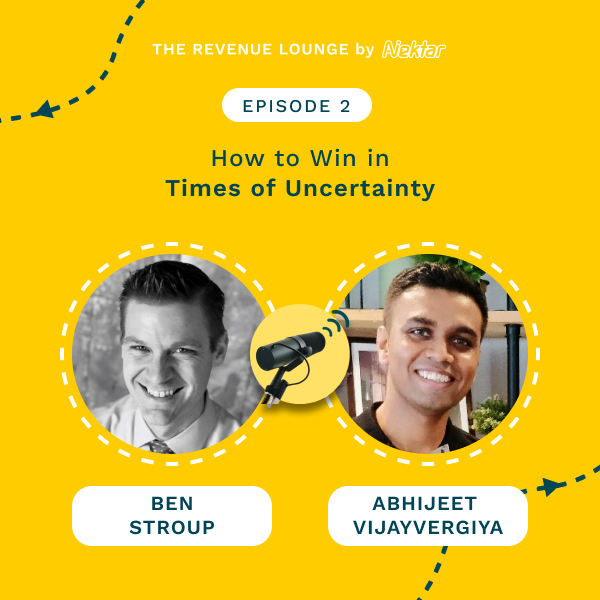
Ep #2: How to Win in Times of Uncertainty
Listen Now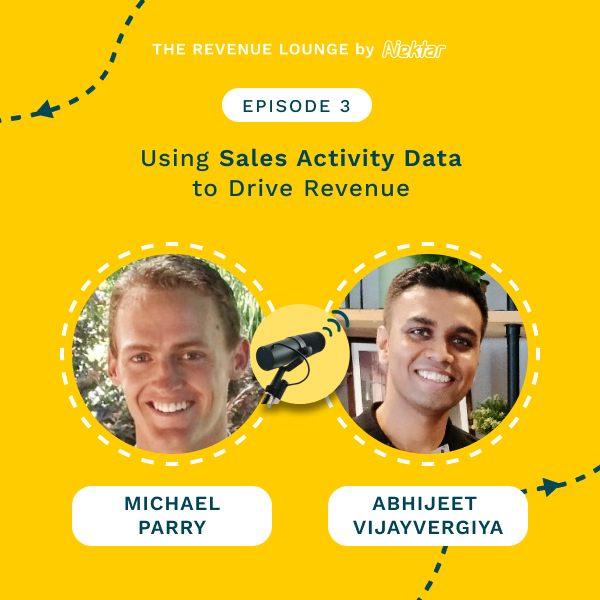
Ep #3: Using Activity Data to Drive Sales Productivity
Listen Now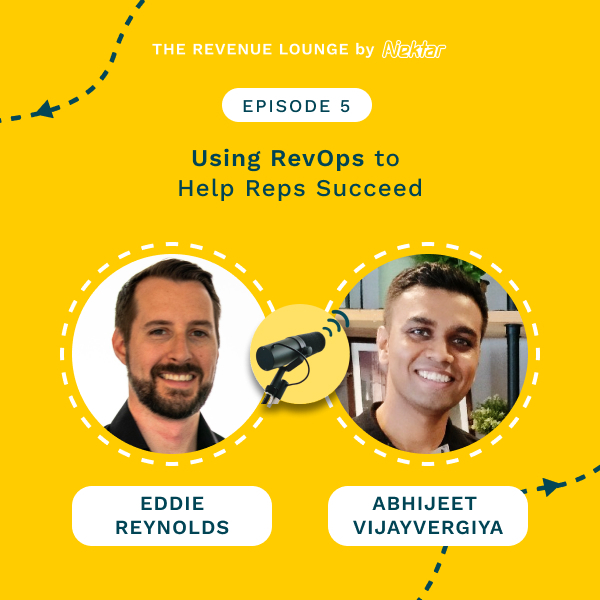
Ep #5: Using RevOps to Help Reps Succeed
Listen Now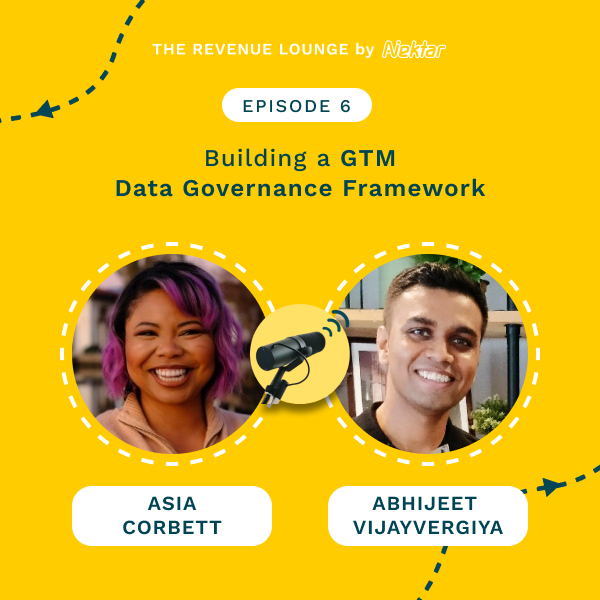
Ep #6: Building a GTM Data Governance Framework
Listen Now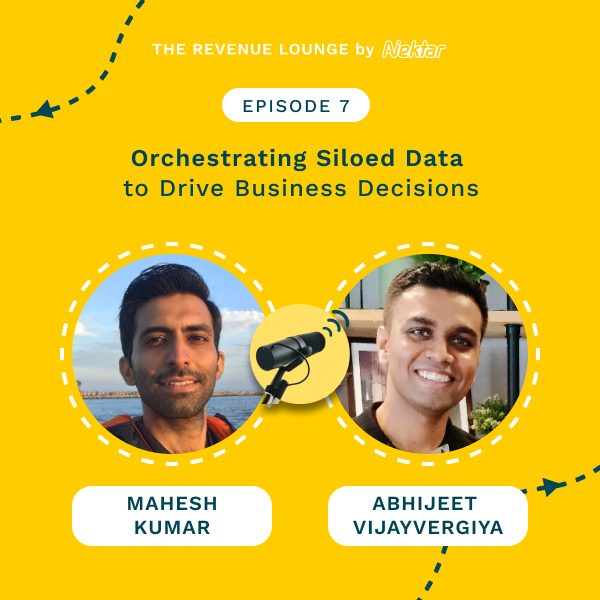
Ep #7: Orchestrating Siloed Data to Drive Business Decisions
Listen Now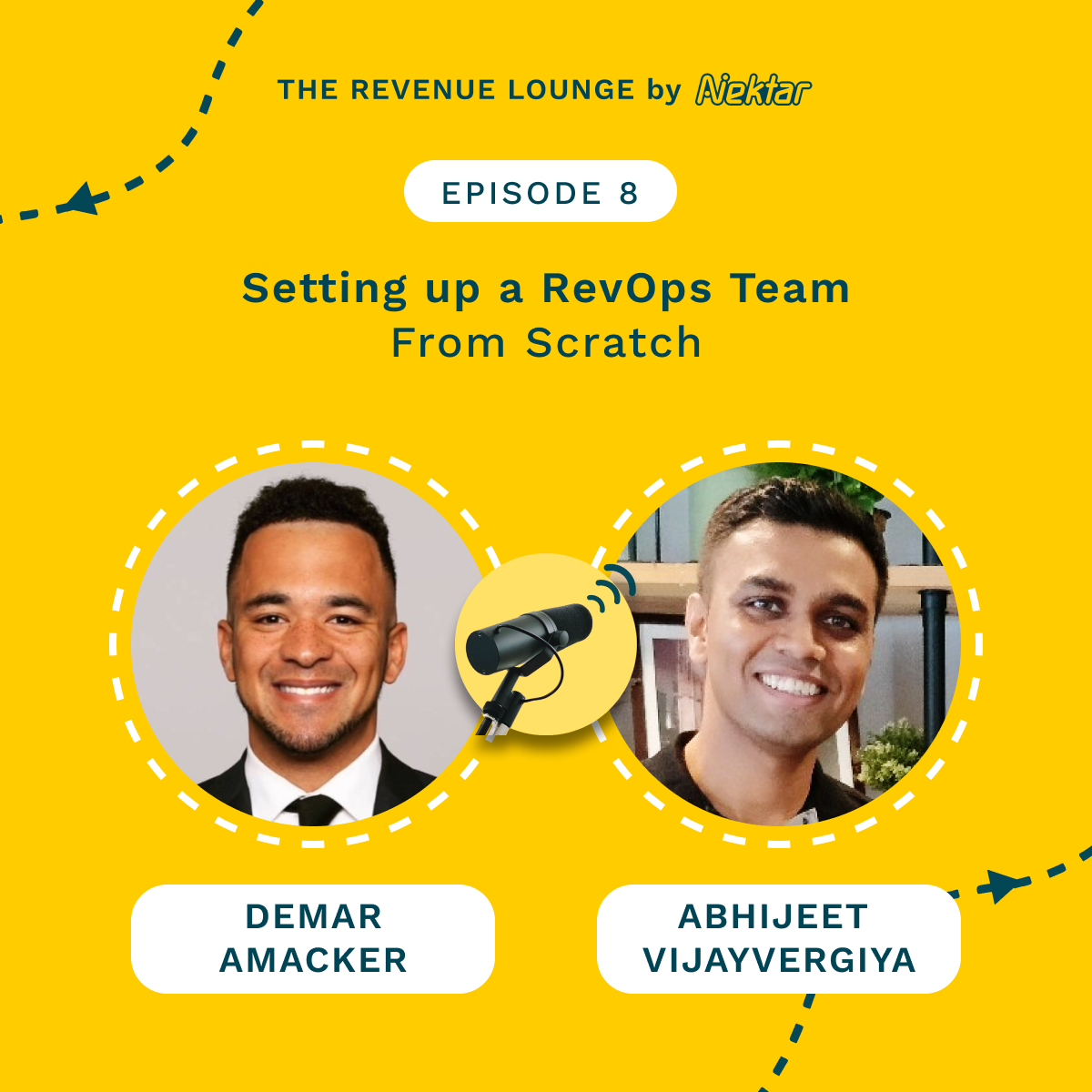
Ep #8: Setting Up a RevOps Team From Scratch
Listen Now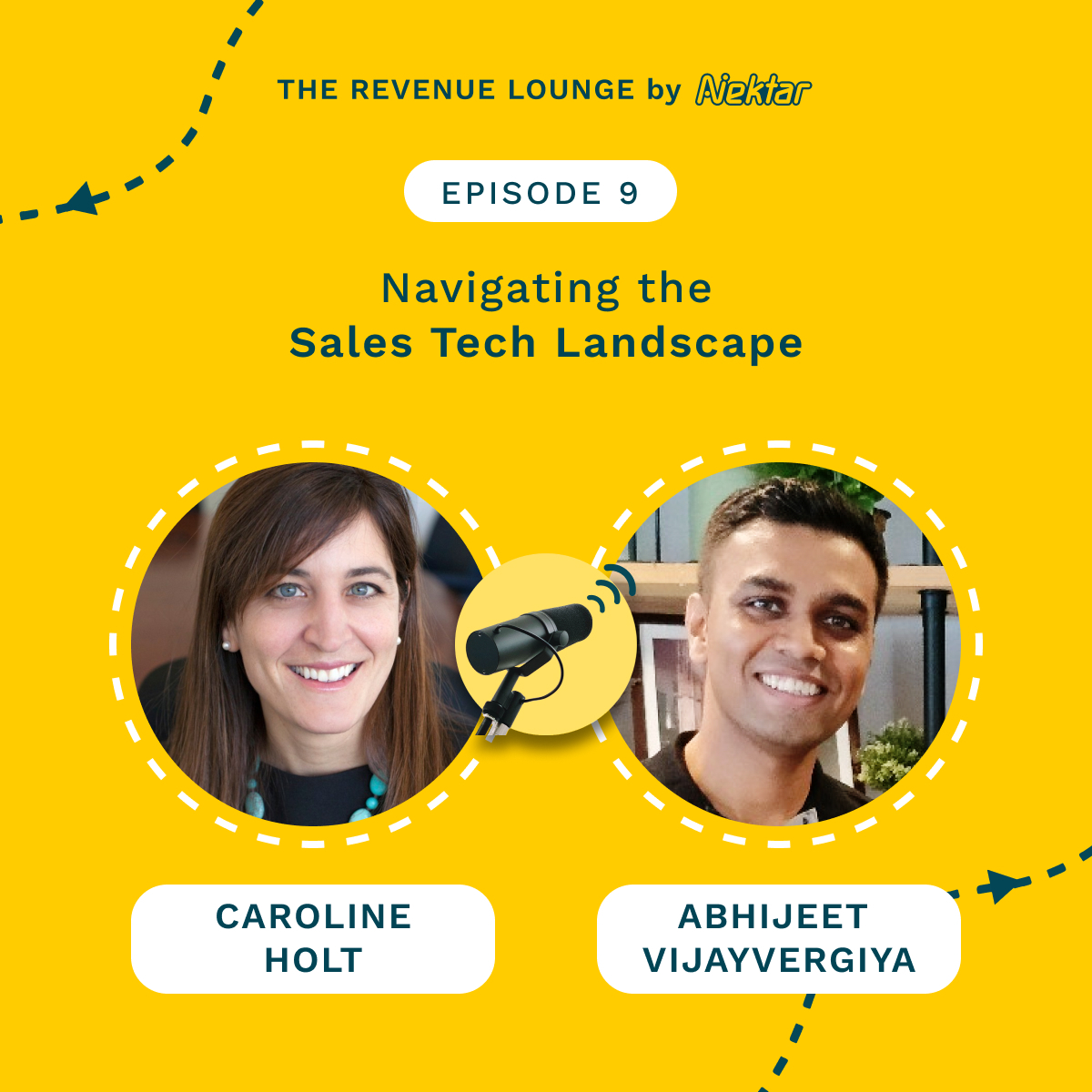
Ep #9: Navigating the Sales Tech Landscape
Listen Now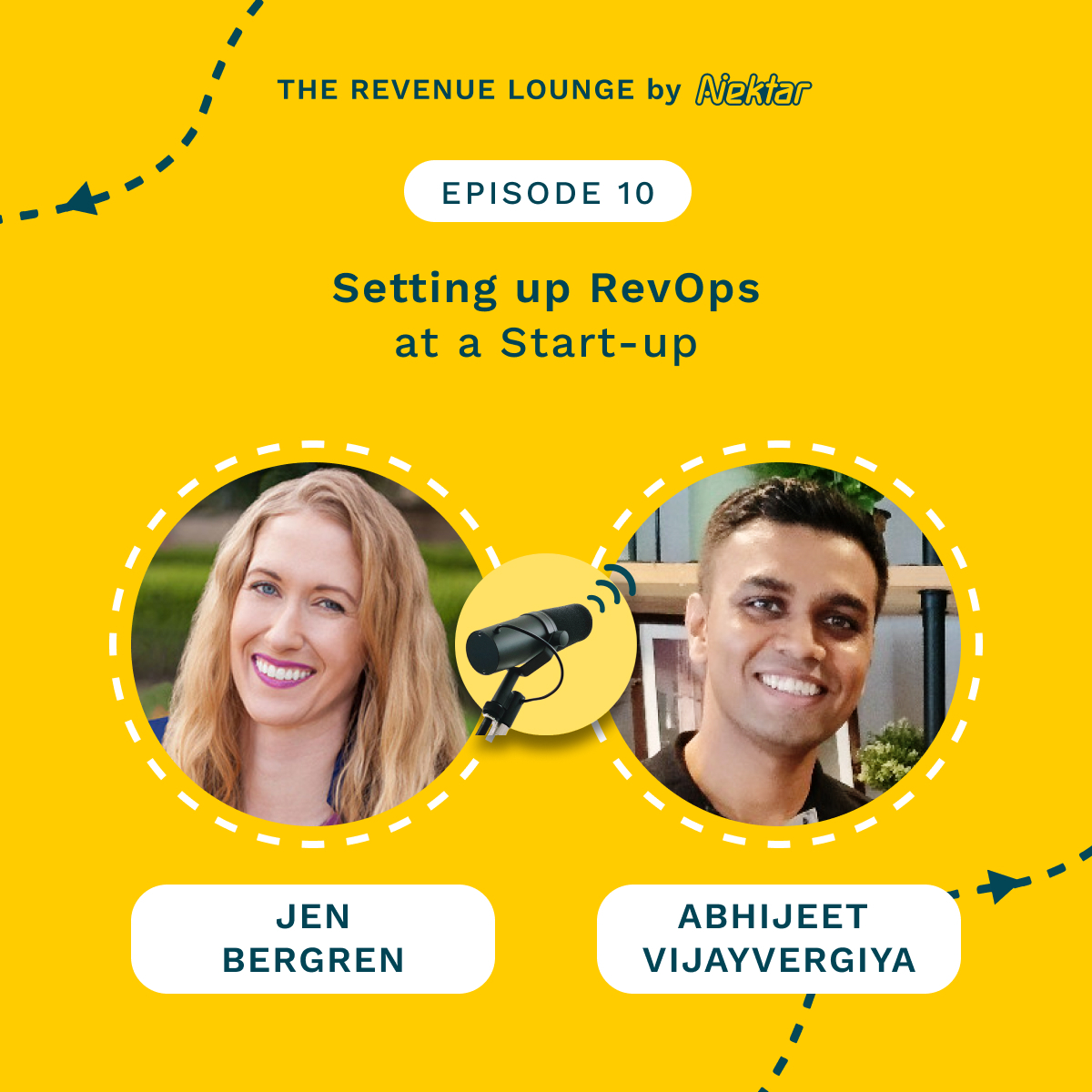
Ep #10: Setting Up RevOps at a Startup
Listen Now